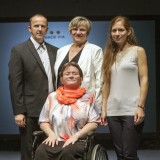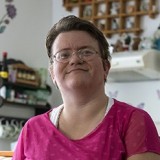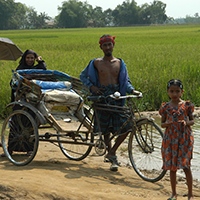Life full of tears is not for me
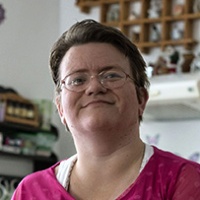
Irena Jindrová, Via Bona Prize finalist
We all have to play the hand we are dealt. Some were given trumps and aces; others were not that lucky. In the end, though, the most important thing is not what cards we have, but how we play them. Some people struggle with hand full of aces, whereas others play a worse hand very well. The latter include our long-time donor, this year’s Via Bona Prize finalist in the Faithful Donor category, Ms. Irena Jindrová, who suffers from cerebral palsy. During the evening ceremony, she showed us her cards.
What does it mean for you, personally, to be involved in the BanglaKids program?
I wanted to pass the help I receive on to other people. I can’t have my own children – neither technically nor physically. Nor am I able to do a “real” adoption. Nothing can be done about that: I have cerebral palsy. I, myself, need assistance three times a day, so I simply can’t take care of someone else. I can only help with money. I only receive a disability pension, but I do have money. Poverty in the Czech Republic is something else than poverty in Bangladesh. I’ve never faced the situation of not having anything to eat. I can’t cook, that’s true. But I’ve never had to think about whether I’m going to have something to eat the next day. To feel that I’m able to help someone is important for me. I’m supporting a second boy now and I hope that he’ll do well and keep studying longer than the first one. They both have written to me that they liked the school and that it was better than staying at home.
How did you feel when you received the news about reaching the final round of the Via Bona Prize?
My feelings were varied. I was quite surprised, as I hadn’t thought my actions had been that amazing. But then I understood when some people shared their points of view with me when I told them about this prize and today’s ceremony. The sponsorship costs me about 7,800 CZK per year. My friend’s son is now going to the first grade. It cost her 5,500 CZK just for September to provide him with everything a first-grade child needs. So, really, I still don’t think I’m doing something incredible.
 To me, it seems important to learn that I mustn’t miss the money I decided to donate. To learn that I don’t have it. Once I decide to give it away, I can’t count on it. As one gentleman on the stage said tonight, “You cannot miss something you do not have.”
To me, it seems important to learn that I mustn’t miss the money I decided to donate. To learn that I don’t have it. Once I decide to give it away, I can’t count on it. As one gentleman on the stage said tonight, “You cannot miss something you do not have.”
Did you prepare for this ceremony in any way?
Not really, I think, apart from buying new clothes, which is something I hadn’t done in a long time. :-) Since I don’t attend similar events very often and as a wheelchair user I don’t wear dresses, it seemed to me that I had nothing to wear. It’s rather funny when you see children in Bangladesh who have nothing to eat, and here I am, thinking about what to wear.
And you’re looking good! :-) How did you like the award ceremony? What caught your attention?
Paradoxically, it was the man that won my category who caught my attention the most. I couldn’t agree more with what he said about how simple regular donations can be. On the other hand, I think it is not that easy to cancel the payments when you need to.
Finding a person who is worse off than me and trying to help them somehow is important to me. People who are better off are easy to find when I focus on the fact that I have a wheelchair and can’t walk. But I’ve never had to worry about having something to eat the next day. Food shouldn’t be the only thing that matters, though; education is equally important. It is good in itself, but what if I lack proper support? I can be educated and homeless at the same time if I lack the support of people around me. That’s why I appreciate that in Bangladeshi programs children also learn about budgeting and housekeeping. Hera, one of my two boys, writes to me not only about what they have learned at school, but also about crops they have grown and about running the household. The fact that he won’t leave the school without having acquired new wisdom and knowledge is another important thing. It’s crucial that education be useful to people for their whole lives. And I think it works there.
Do other factors influence your decisions? How does one choose who to support when there are so many projects and organizations today?
I’ve chosen ADRA because I’d known it. I’m a person who needs to know where she sends the money and what reasonable goals she supports. The possibility to sign an agreement with you was another advantage. But I just couldn’t choose the child; when I saw them on the webpage, I wanted them all. That’s not possible though.
So I messaged the coordinator Šárka and she told me she could find a child who had recently lost his or her donor. Both boys were chosen this way, because I’m unable to decide whether this child or that one.
I’d like to know how you do it – how come you’re positive all the time and bring joy to people around you.
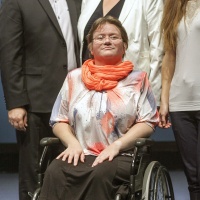 That’s very simple. I’m not sure how I did it before, but for the last 10 years I’ve been helped by the Bible. People who know me longer, however, say I haven’t changed. It all started when I was two and a half and I had to spend 9 months in a medical institution every year. Without parents. Back then, there were 12 to 16 of us in one room. But I didn’t feel bad, as I was normal there. It was the other way around: I felt weird at home, because only my parents, my family, acted normally around me. To everyone else, I seemed different. This might be the reason why I’m drawn to people from lower social layers. In the medical institution, I learned to speak Romani and Slovak. I can also sign to some extent. All this gave me a solid foundation on which I could build my own independent life. They taught us we weren’t sick. Someone with tonsillitis is sick. I have a handicap. And one can live with a handicap. This helped me a lot and became my creed: “I am not sick, I have a handicap.” Or I am physically disabled if you don’t like the word “handicap”. Otherwise, I think my life is normal. I live alone in a wheelchair accessible flat in a boarding house with nursing care. Of course the caregivers help me three times a day, but I manage well.
That’s very simple. I’m not sure how I did it before, but for the last 10 years I’ve been helped by the Bible. People who know me longer, however, say I haven’t changed. It all started when I was two and a half and I had to spend 9 months in a medical institution every year. Without parents. Back then, there were 12 to 16 of us in one room. But I didn’t feel bad, as I was normal there. It was the other way around: I felt weird at home, because only my parents, my family, acted normally around me. To everyone else, I seemed different. This might be the reason why I’m drawn to people from lower social layers. In the medical institution, I learned to speak Romani and Slovak. I can also sign to some extent. All this gave me a solid foundation on which I could build my own independent life. They taught us we weren’t sick. Someone with tonsillitis is sick. I have a handicap. And one can live with a handicap. This helped me a lot and became my creed: “I am not sick, I have a handicap.” Or I am physically disabled if you don’t like the word “handicap”. Otherwise, I think my life is normal. I live alone in a wheelchair accessible flat in a boarding house with nursing care. Of course the caregivers help me three times a day, but I manage well.
When you try and find something bad about life, you’ll always succeed. More important, in my opinion, is to find something nice in life. I want to find something I can “leave” here. And if I’m seen as a positive person, that’s only for the best, as life full of tears is not for me. But it’s true that I can also get very angry. When I have an outburst, it is something. I think it was Seneca who said something I abide by: “Three things cannot be retrieved: yesterday, a spent arrow, and a spoken word.” When I make a mistake, it can be fixed, but when I say something, I can never take it back.
When they put you in a room with all kinds of people for half a year, you have to get on with them. Yes, we were children but not forever. I spent 9 months there every year till I was 21. Then the insurance company stopped it, as my condition wouldn’t improve; but it was compulsory for us as children. Among those handicapped people there was always someone who needed a little help, the right amount of help I could provide.
Who is your hero?
I watch and admire the Michal Velíšek Prize and various children’s stories. Child heroes who save lives. My family is also one of my heroes because they kept me and raised me in this country’s difficult era. That was unusual. Handicapped children often ended up in institutional care. For me, a hero is anyone who gets up in the morning even though they don’t feel like it. Anyone who doesn’t complain about how terrible they feel. Everyone attending tonight’s ceremony wants to help; in general, though, commercials tell us to feel good, to think everything is here for us, but that’s not how life works.
We alone have to make the choice and start helping or supporting others. When you do it only because you feel obliged, I don’t think it’ll have the effect.
Thank you for the interview.
